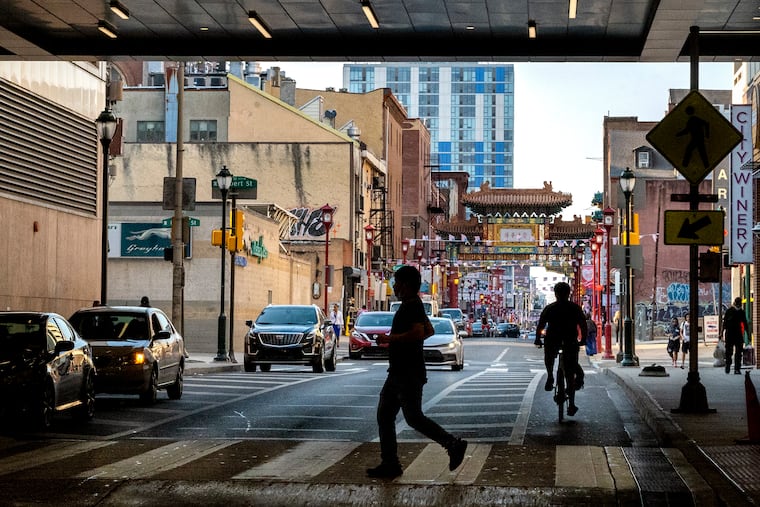How Chinatown got blindsided by a City Council bill that could have helped the 76ers build a new arena
The mystery over the origin of the Filbert Street provision has lingered in the minds of many Chinatown residents and advocates who are skeptical of the 76ers’ arena proposal.

Shortly before a key legislative deadline this month, Hercules Grigos, a lawyer working with the 76ers’ development team, sent City Councilmember Mark Squilla’s office a revised version of a bill to refinance a downtown parking garage that included an unrelated provision that would have made it easier to close Filbert Street between 10th and 11th Streets, according to Squilla.
The bill’s primary purpose was to ensure that the city can recover money owed to it by the financially distressed garage operator, and Squilla said his office had been coordinating with Mayor Jim Kenney’s administration and outside attorneys working with the city. He had not worked on the bill with Grigos, a partner at Klehr Harrison, prior to the last-minute email, and he said he assumed that Grigos was sending him the final version of the bill on behalf of the administration.
» READ MORE: Parking garage bill sparks the first City Hall dust-up over the 76ers’ arena proposal
Knowing that he could amend the new version of the bill in committee if there were problems, Squilla said he introduced the legislation without reading it on Dec. 7, the deadline to introduce measures that need to pass by the end of the year, like the parking garage legislation.
“Unfortunately I never saw it because it came last minute, and I wasn’t in the office,” Squilla said. “I don’t know if I would have caught it if I read it.”
A Kenney spokesperson, however, said the city never directed Grigos to work with Squilla on the Filbert Street language, which would have helped facilitate the construction of the proposed arena.
“Any conversations regarding this language occurred after it was added by the Sixers,” Kenney spokesperson Kevin Lessard said. “The administration was never in favor of this language.”
The mystery over the origin of the Filbert Street provision has lingered in the minds of many Chinatown residents and advocates who are worried that the arena could displace Center City’s vibrant Asian American community. They said they felt betrayed that the legislation would be considered before a community engagement process could be completed — something Squilla promised wouldn’t happen.
After receiving complaints, Squilla ended up stripping the provision from the parking garage bill, which Council approved last week.
But Debbie Wei, a cofounder of the group Asian American United, said many in the Chinatown community remain distrustful of the team and the city, thanks to the rounds of finger-pointing and vague public statements that followed the dustup over the bill.
For instance, she noted that David Gould, chief diversity and impact officer for the 76ers’ ownership, said at a neighborhood meeting last week that the language was added to Squilla’s bill “inadvertently,” 6abc reported.
» READ MORE: Chinatown residents loudly denounce Sixers arena proposal at contentious meeting
“You’re just walking around with a paragraph of legislation in your hand and you trip and you’re like, ‘Oops, I’m sorry?’” Wei said. “If you get caught with your pants down, just come clean.”
Grigos did not respond to a question about the provision being added inadvertently, but said in a statement that “it is not unusual for there to be parallel work streams to address ancillary issues while the community engagement process moves ahead.”
“As is normal practice,” he said, “we proposed language to be considered for inclusion in the bill, however this language was not part of the required zoning legislation that we will ultimately be seeking upon completion of our community engagement process.”
Squilla, whose 1st District includes the proposed arena site, said he remains committed to ensuring the community’s needs are met before any plan moves forward. And he objected to the administration’s public statements implying that his office was responsible for the Filbert Street provision.
“They’re saying that that wasn’t their language, but an attorney that they were working with had shared that language with us last minute,” he said.
Wei said the fight over the Council bill marked a bad beginning for the team’s efforts to make good with the neighborhood.
“I guess I should be shocked that private-interest developer attorneys are able to actually write legislation for their own self-interest, but apparently people are telling me that’s just how it’s done,” Wei said. “The fact of the matter is everyone has let our community down. Everyone has lost their credibility.”